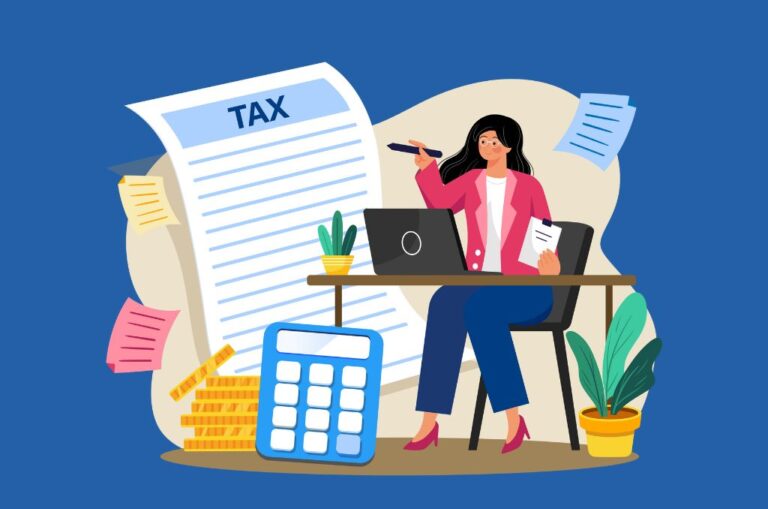Filing taxes is no one’s idea of a good time. It can seem intimidating, overwhelming, or boring if you’re new to filing taxes. The internet is flooded with resources and businesses that promise to simplify tax season or take it off your plate entirely. These businesses are tempting when you’re learning how to file tax returns. However, choosing someone to do your taxes is like buying a car: shopping around will only help if you know what you’re looking for.
Our start-to-finish guide to filing your tax return will help you learn how, why, and where you can file your tax return. Once you have a good idea of what you’re looking for, you can confidently jump headfirst into tax season!
How To File Tax Returns (and Why You Should Never Skip It)?
While learning how to file a tax return, you might wonder if filing your return is even worth it. After all, lots of people wait to file their returns every year. It can’t be a big deal. Well, yes and no.
Some people have a filing requirement. This means that the amount you make or dependents you have, depending on your filing status, requires you to file a tax return, even if you’re a W-2 worker and don’t have any other income.
Most people are required to file tax returns, and filing correctly could lead to you being audited. Being audited means you must file your tax return with the IRS reading over your shoulder. Auditing can be time-consuming and stressful and lead to extra fines or fees. Even if you are okay with being audited, you should still learn how to file a tax return for your overall financial wellness. When you file your tax return, online or in person, you will likely get a refund.
A tax refund occurs when the automatic withholding from your paycheck is too high. Once a year, you can submit your total income matched up with your specific personal circumstances. This allows the IRS (and you) to fix any errors throughout the year.
Tax returns can also include “deductions” as part of your refund. A deduction is an amount of money that isn’t taxable. This can include donations to charity, work-related expenses, childcare, and some property and medical expenses.
The number of deductions or automatically withheld pay determines your refund. Your tax refund can range from a couple hundred to a few thousand dollars. We consider learning how to file a tax return an important part of financial wellness! Your return can be used to pay down debt, make important purchases, or even start a new savings account.
On the path to financial wellness, every penny counts. Even without your refund, knowing how your money works is a key part of your wellness journey. The more you know about taxes, the more you know about your money. The more you know about your money, the more you can take charge of your financial situation.
Getting Ready To File Tax Returns
When learning how to file tax returns, preparation is key. Filing your taxes is all about simultaneously getting the right documents in the same place. Anyone who has been to the DMV knows how frustrating it is to get there and learn there’s one document you still need to include. You have to start all over again and (if you’re anything like me) make multiple trips before you get it right.
To avoid having the same thing happen with your taxes, ensure you’re well-prepared before you even begin. Otherwise, you’ll start and stop, and your taxes could take days or weeks. Once you know how to file tax returns, you’ll get better and better at storing relevant information in a convenient place. This means that as soon as something relevant comes to you at any point in the year, you’ll place it in a designated place, so you don’t have to search for it this time next year.
It is overwhelming to learn to file your taxes, so we’ll keep it short here. For more in-depth info, check out the IRS’s website. Their search function can help you find the answer to any specific questions you have. Each person’s tax situation is unique, and this list is by no means exhaustive, but it’ll get you started!
There are three main categories of things to have prepared before you file.
Personal Details
When navigating to file a tax return, it’s a relief to know that the first step is easy as pie! You’ll need to have all your details for the tax year. This includes information like:
- Your name and social security number
- Your age
- Where you lived
- Where you worked
- Your marital status
- Any children or other dependents you cared for during the year
All this information helps the IRS identify you as you. This means you’ll get your tax return, not someone else’s. This info also helps determine how much you should owe on taxes and whether you’ll have any automatic deductions or credits, like the child tax credit.
Income Details
Next on the list is income. When you’re learning how to do your taxes, the key thing to remember about income is to report everything. Leaving off income that you made freelancing or at a part-time job is a surefire way to get audited and hit with a fine. You’ll usually have a form to help you accurately report your income. These forms include:
- W-2s
- 1099s
- W-4s
These forms are all sent to you by your employer (or customer if you’re an independent contractor using 1099), who has also sent a copy to the IRS. This is why reporting everything is so important. If the IRS’s records from you and your employer don’t match, you’ll both be audited for it.
Most companies allow you to access these forms online. Chances are you don’t need to wait for your paper copy to come in the mail. These forms are the most important part of filing your taxes, so ensure you have them before you even start!
If you own an LLC or a sole proprietorship, things might differ slightly. We’re talking about how to file tax returns here, though, so we’ll leave the ins and outs of small business finance to another article.
Deduction Details
Finally, there are your deduction details. The number of deductions you qualify for can vary from one or two to dozens. Finding every deduction can be paralyzing, especially when you’re getting familiar with how to file tax returns. We’ll go over some of the most common deductions for our purposes.
The most common deductions are:-
- Charity deductions (you’ll want a written acknowledgement for gifts larger than $250).
- Medical and dental deductions (with some exceptions).
- Mortgages and some home improvements.
As you learn how to file tax returns, you’ll find that this list is only partially exhaustive. You likely qualify for more deductions than this since you can get deductions for the miles it takes to drive to work, state and local taxes you’ve paid, some insurance premiums, and much more.
For the person trying to file hassle-free, though, there’s no problem with keeping it simple. The important thing is to get all of your documentation in order. When your documentation is in order, filing a tax return is a breeze, whether for personal details, income details, or deduction details.
How To File Tax Returns Online?
Believe it or not, the IRS has asked taxpayers to file accurate tax returns online to get their money quicker. And it’s easy to see why! Filing online is faster and easier for you, the IRS, and the USPS. Add in the direct deposit options that filing online gives you, and it’s no wonder 94% of tax returns were filed online last year.
How Can You File A Tax Return Online?
First, make sure your information is accurate and easy to process. I know we’ve said this a few times now, but it’s truly crucial. Mistakes on your tax return make the process more difficult, delaying your return.
Double-check your answers against every available resource to ensure your return is accurate. When you’re mastering how to file a tax return, remember that this isn’t a school test. You can check and double-check your answers; no one will bat an eye, not even the IRS.
In fact, the IRS has some great resources on their website, and you can use the search function for specific problems. You can also ask a tax expert. Many places you can file a tax return online have chat functions as part of their paid plan.
Once you’re sure your information is in order, filing tax returns online is as simple as picking a site you want to work with and inputting your information. Not sure where to start? We recommend TaxSlayer. They have some of the most affordable prices, and even their free plan lets you contact tax experts with any questions.
When you file a tax return online, you’re sure to beat the rush to in-person tax preparers and get your tax return in your hands in a cinch.
File Your Taxes With Ease and Save Big!

File with TurboTax! Every deduction found. Every dollar you deserve. Start today.
How To File Tax Returns For Free?
More and more people are interested in learning how to file tax returns for free. It’s no surprise, as people working on their financial wellness know there’s no reason to pay someone to do something you can do yourself.
Not everyone can file their own tax return, though, so here are some guidelines. These will help you determine whether you can file your tax return for free or whether it’s worth shelling out a couple of bucks to work with an expert.
- Do you have any income besides your W-2?
- Do you have any dependents?
- Do you own property?
- Do you have any large deductions to claim?
- Did you use government-funded programs this tax year, such as WIC, food stamps, or government-funded insurance?
If you answered yes to any of the above questions, then it’s best to ask for help.
You can still file your own tax return using forms available on the IRS’s website, but these things will make filing your taxes much more complex. Paying a little bit to have an expert on hand now will help you avoid larger fines later and dodge the possibility of being audited altogether.
If you didn’t answer yes to any of those questions, Congratulations! You’re in the perfect position to file your own tax return for free. Filing for free is a great way to file your taxes quickly. You don’t need to wait for a tax expert to be available, and you don’t need to collect too many documents.
There’s not much else to do when figuring out how to file tax returns for free. Just plug in your info, and you’re done!
Still, Waiting For Your Tax Refund?
You’ve figured out how to file a tax return and do the paperwork… Now you just have to wait. When you have big plans for your tax return, waiting for it to come in is like waiting for water to boil.
The good news is that you aren’t left high and dry to wonder when your return will hit your bank account. According to the IRS’s estimate, most refunds will take about 21 days to process. Inaccurate, backdated, or incomplete information can take longer, but you can expect it within 21 days for simple returns.
Besides being accurate, there’s one more thing you can do to make sure your refund gets to you as quickly as possible. Make sure you select a direct deposit rather than a paper check. Some people are nervous about giving their banking information out, but for tax returns, it’s the quickest, easiest way to get your refund.
You can get more exact info using the IRS’s Where’s My Refund? tool. You’ll need specific tax return information to use this tool, but don’t worry. All you’ll need is your name, filing status, and your tax return amount.
While you’re still gathering information on how to file a tax return, make a note to write down the exact amount of your return. This way, you can track exactly when your return hits your bank account.
Have something time-sensitive that you need your tax return for? Many personal loan companies specifically help people advance their tax returns. With a personal loan or tax advance, you can get the money ahead of time and pay back the amount from your tax return.
While there are better ideas than this if you’re hoping to put the money from your tax return into savings, it can help in other situations. For instance, if you have past-due debt repayments, you must pay them off.
Preparing to wait is part of learning how to file a tax return. However, the sooner you file your tax return, online or in person, the sooner that money will come in, so take your time!
How Tax Brackets Work In The USA?
Tax brackets in the USA function on a progressive scale, ranging from 10% to 37%. The income you earn falls into different brackets, each with its own tax rate.
For example, if you’re a single filer earning $50,000, you’ll pay 10% on the first $11,600, 12% on income between $11,601 and $47,150, and 22% on the portion from $47,151 to $50,000.
Understanding your tax bracket helps you gauge the impact of additional income or deductions on your overall tax liability. Be aware of the tax rates applicable to each bracket and plan your finances accordingly.
How Are Your Taxes Calculated In The USA?
Calculating your taxes involves considering your filing status, deductions, and credits. Your filing status (single, married filing jointly, head of household, etc.) determines your standard deduction.
Deductions reduce your taxable income, and common ones include the standard deduction, itemized deductions (such as mortgage interest or medical expenses), and personal exemptions.
Knowing your effective tax rate and understanding how these factors interact can guide you in making financial decisions throughout the year. Keep accurate records and consult tax professionals to ensure you optimize your tax strategy.
Using Tax Credits To Lower Your Bill In The USA
Tax credits directly reduce your tax liability. For instance, the Child Tax Credit offers up to $2,000 per qualifying child, and the Earned Income Tax Credit benefits low-to-moderate-income earners.
Education credits like the American Opportunity Credit and the Lifetime Learning Credit provide relief for qualified education expenses. To benefit from these credits, understand their criteria, when they apply (e.g., during specific years of education), and ensure you meet all eligibility requirements.
Claiming these credits can significantly reduce the amount of taxes you owe, leading to potential refunds.
Reducing Income With Tax Deductions In The USA
Tax deductions lower your taxable income and can be classified as either above-the-line or itemized. Above-the-line deductions, like contributions to retirement accounts, reduce your adjusted gross income (AGI). Itemized deductions, such as mortgage interest, medical expenses, and charitable contributions, are subtracted from your AGI to determine your taxable income.
Consider timing your deductions – for instance, bunching charitable contributions in a single year for itemization. Keep detailed records of your expenses, understand the timing of deductions, and consult with tax professionals to maximize your tax-saving opportunities.
Conclusion
Filing a tax return may not be anyone’s dream, but it doesn’t have to be a nightmare. Preparing to file taxes is the most difficult part, and now that you know how to file a tax return, you can start making that easier and easier.
Filing your tax return is important to financial wellness, so way to go! You’ve made another step towards taking control of your money. Understanding your money is a huge part of managing well, and taxes are a big part of that.
Learning to file a tax return empowers you to be more prepared next year. Being more prepared next year allows you to put one more aspect of financial wellness on autopilot. With tax returns becoming more accessible, there’s no reason to skip this important process.
You should lean into it! Embrace filing your tax return as part of your financial wellness. After you’re comfortable filing your tax return, check back with us here at Penny Calling Penny. We’ve got everything you need, from learning to budget to starting your latest side hustle and dealing with debt. Welcome to your financial future; we’re glad to be here!
Find this helpful? Share it on Pinterest, LinkedIn and Facebook for your dear ones. Also, subscribe to our newsletter to receive articles like these straight to your inbox.
Did you take our Reader Survey? If not, it only takes 1 minute and you can take our survey here.
FAQs
Factors such as age, filing status, dependence on others, and total earnings play a role in determining the minimum income required to file a U.S. federal income tax return.
You may not need to file a tax return if you have no taxes to pay. However, if you owe taxes and do not pay by filing a return, the IRS will employ other ways of collecting, such as taking money from your wages. Therefore, filing a tax return regardless of your liability is advisable.
With Free File, you can submit Form 4868 online to get an extension for filing your taxes. Such extensions are usually granted automatically, yet you must pay any taxes you owe by April 15th (Tax Day).









